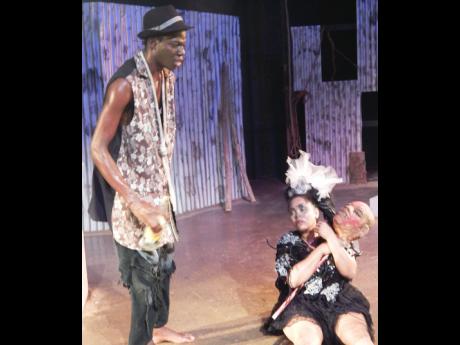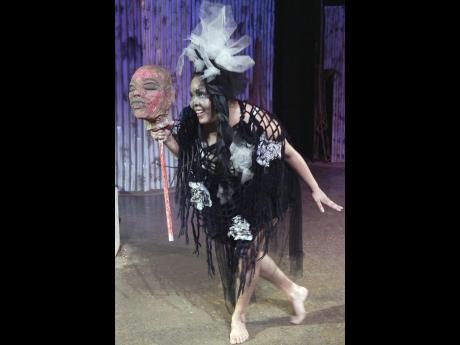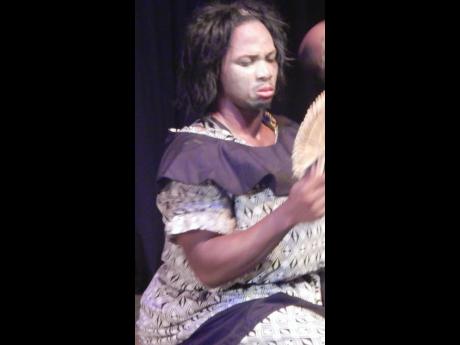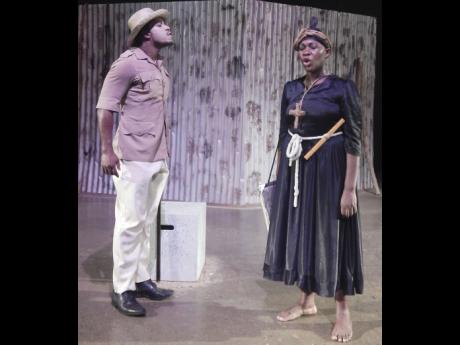Not My Child misses Euripides' standard
In making decisions, should you follow your head or your heart?
The age-old question of balancing intellect and emotion was addressed by Athenian playwright Euripides in his 405 BC tragedy The Bacchae, which was staged at the Edna Manley College of the Visual and Performing Arts' School of Drama earlier this month. It was directed by lecturer Marvin George.
The question is also addressed in David Tulloch's Not My Child, now on at Green Gables Theatre. Tulloch does not have Euripides' skill, and though the true events on which he bases the play are at least as strong as The Bacchae's story, his script does not exploit their full potential.
Since Tulloch, the producer, chose himself to direct the play, neither playwright nor producer had the benefit of an independent dramaturge (script doctor) to strengthen the weaknesses. Nepotism is as harmful in theatre as in politics.
MOB VIOLENCE
The Bacchae is about Pentheus disrespecting Dionysus, who exacts horrific vengeance by having Agave, Pentheus' mother, and a mob of other women kill him.
What is the playwright's message? Pentheus is a king, so obviously his views on life are important. But Dionysus is a god, which suggests his views are more important. Pentheus, a man, is ruled by his intellect and is opposed by emotion-driven females.
We can put many different interpretations to those facts, but up to this point in the play, we might feel Euripides is anti-intellect and pro-emotion. However, Agave rips Pentheus' limbs and head from his body while possessed by the spirit of Dionysus, mistakenly thinking her son is a mountain lion. When she comes to herself, she is horrified.
So is the playwright really advocating an emotion led life? I put the question to George, the director. He said the play calls for "a balance between head (intellect) and belly (emotion)."
CARNIVAL VIBE
He gave the production a Caribbean carnival setting and had the cast of drama students act, dance and sing with the energy associated with playing mas. Soca music was provided by an offstage band and the whole production was quite exciting.
Tulloch's direction of Not My Child could use some of that energy. Too many of the scenes drag. This is despite the play being packed with sensational issues and incidents - child abuse, mental disability, seduction of a married man by a 14 year-old schoolgirl, infidelity, blackmail and murder.
In The Bacchae, the murder is offstage. In Not My Child, it is onstage. In both plays, murder is followed by dismemberment.
Three characters in Not My Child have to choose between their emotions and intellect. Poverty forces Mavis (Leonie Forbes) to give her intellectually challenged daughter, Patience (Rosie Murray), to an older man for sex in return for money. Poverty also causes the daughter of that union, Deondra (Crystal Fletcher), to become the mistress of a married man, Alvin (Donald Anderson).
Still, along with the money to pay the bills, Deondra can demand clothes and a state-of-the art cell phone. Mavis and Mary make reasoned decisions. Alvin is led by lust.
George told me that because he wanted to base The Bacchae on the Caribbean folk forms of Carnival and Jonkunnu, he introduced his cast to the play through movement. They didn't start learning lines until the end of the first week of rehearsals. The result is that the spectacle is as important as the dialogue.
The text's story is all-important in Not My Child; there is little of visual interest. Even the play's most violent incident, the murder, is carried out with one hand and is practically stationary.







